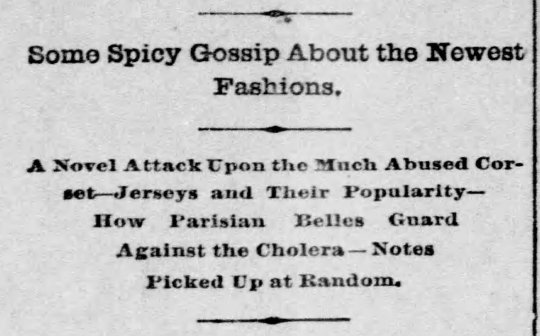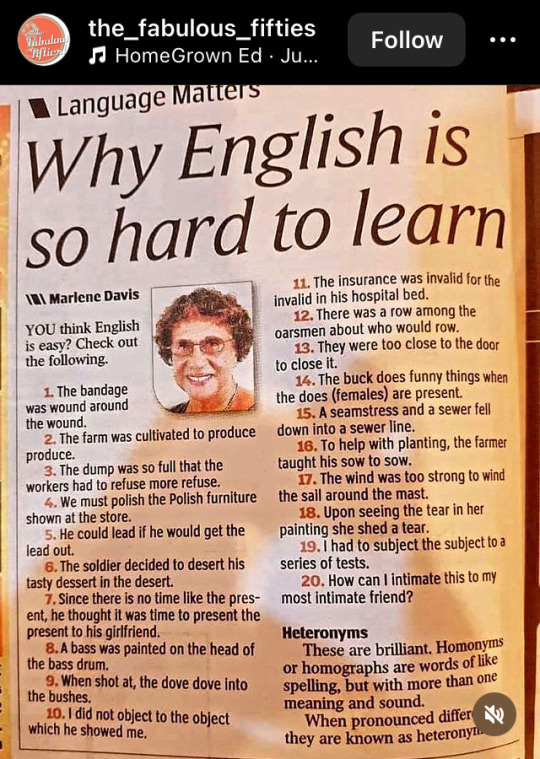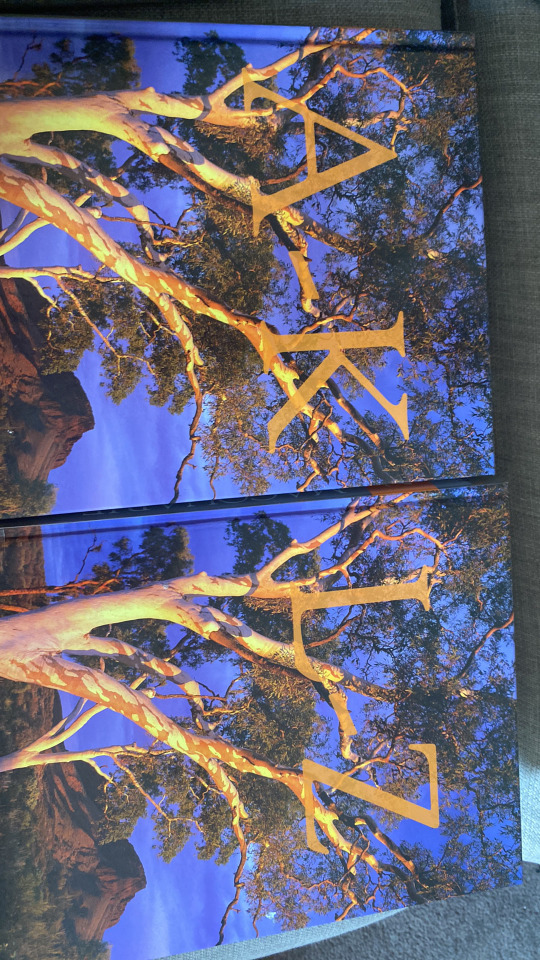#the english language
Text
398 notes
·
View notes
Photo

I was surprised earlier this week when I came across the word “spicy” (as used to describe rumors/gossip) in an article from 1906, and got curious how old the expression was. After digging around for a few hours, the earliest use of the word in this context I could find was 1845. Interestingly the word “juicy” (same context) appears to have popped up not long after in the mid-1850s.
So I just thought it was very important for all you historical fiction writers out there know that you can have Queen Victoria discuss the juiciest gossip with her ladies in waiting or Millard Fillmore ask for the spicy details and be 100% historically accurate.
(image source: The St. Louis Post Dispatch, July 26, 1884.)
715 notes
·
View notes
Text
The fact that the crusty stuff you get in your eyes when you wake up is called "sleep" in English bothers me so much.
In Portuguese it has its own independent word: remela.
#did you know#vocabulary#portuguese langblr#portuguese language#langblr#brazilian portuguese#portuguese#brazil#english language#the english language#english langblr
425 notes
·
View notes
Text
Around here we've always pronounced it appa-lay-shun so when I heard it the other way for the first time a few days ago it was like a punch to the face.
42 notes
·
View notes
Text
The internet is so god damn annoying.
This fun little piece came up on my instagram feed:

And the comments are insufferable!
First, you have people insisting “dove” as a verb is not a word. They are wrong lmao. They’re claiming “dived” is the past tense for “dive” in the UK, but we only use “dove” in the US, and killjoy Brits are in the comments like “lulz American English isn’t real English.” It’s called a dialect, you arrogant morons.
Then, you have people saying these heteronyms are a sign of English being a failed language. Again, this is incomprehensibly stupid. That is not how language works! There’s no way to measure the “success” of a language lol and to say it’s failed because of heteronyms is just brain worms.
Finally, you have people insisting English isn’t hard to learn and it’s only dumbass monolingual English speakers who think so. I guarantee you that if I showed this little page to my ESL students, it would trip them up. Every language has the potential to be difficult to learn, especially in adulthood, and what makes a language easy or hard to learn typically varies from person to person.
In summary, I hate to sound elitist, but people who know nothing at all about linguistics have THE dumbest takes on language.
58 notes
·
View notes
Text
I’m bored and have access to dictionaries, give me a number and I’ll give you a word

50 notes
·
View notes
Text
Instead of continuing to use "animals" to refer to non-human animals when we KNOW humans are ALSO animals, we should just start using "beasts". "Animal Other than Human" is ALREADY one of it's established meanings:

22 notes
·
View notes
Text
okay genuine confused language question:
in english when do you use while and when do you use whilst??? i cannot figure out the difference? are they interchangeable? is there a grammar rule to it i was never taught??? help
9 notes
·
View notes
Text
Bingo for spelling bee / english spelling games / “english is weird/complicated” words
that’s just a word of latin origin
straight up a loan word
(subcategory of ^. straight up a french word?)
scientific term / technical jargon
scientific term that’s literally made up of common greek/latin prefixes/suffixes
that’s a name (geographical place, historical person, other country’s currency, etc)
word that i’ve never heard in my life and yet was able to guess the spelling of, proving that english orthography is more consistent than you’re precisely trying to show
#linguistics#language#the english language#english is weird#english language#linguistics tag#moralgayness
5 notes
·
View notes
Text
Today I learned the english word for tit as in the bird. Who invented this word? I just wanna talk
Now every time i see a couple of them outside, my brain goes" Look at those tits"
And I can't be thinking about that. What would Jesus say?!
10 notes
·
View notes
Text
168 notes
·
View notes
Text
Some Asians need to Understand that just like variants of speaking Chinese or Japanese.
ENGLISH HAS MANY VARIETIES, SCOTTISH ENGLISH, COCKNEY, TEXAN, ETC.
#english#english dialects#dialects#accents#the english language#languages#scottish#texan#cockney#chinese language#japanese language#this came from me after I got pissed off by a man saying this white guy was speaking Singaporean accent and be like#wHy dOES hE SpEAK likE tHaT#hE shOuLD sPeAK WeStERN EnGliSH#WHAT WESTERN ENGLISH#DEFINE WESTERN ENGLISH#THERE IS SO MANY ENGLISH VARIETIES FROM THE WEST#PICK ONE#ENGLISH IS JUST 3 LANGUAGES HIDING UNDERNEATH A TRENCHCOAT
4 notes
·
View notes
Text
English speakers are really missing out on the knowledge that "astronaut" means "sailor of the stars."
It's such a delightful bit of etymology that Romance language speakers can typically readily pick up (astro = star, nau = ship, nauta = sailor) to the point that in Brazilian Portuguese someone who uses the internet is called an internauta (sailor of the internet).
#astronaut#slang#brazilian slang#brazilian portuguese#etymology#did you know#portuguese langblr#langblr#the english language#romance languages
221 notes
·
View notes
Text
So I was looking up the word meaning for certain animals and....and yeah the origin of Tortoise/Turtle is quite literally ridiculously insane 😂
If you don't wanna click and read the whole link:
Unfortunately the etymology of these words only makes matters more confusing.
Before the 14th century in Old English, “turtle” was a word for what we now call a turtledove. The word “turtle” was meant to sound like a turtledove’s cooing.
Only in the 1600s did the word turtle become a word for the reptiles, when the French tortue was misunderstood as sounding like the English “turtle.”
Before that, the English word for the reptiles was “tortoise,” and aquatic turtles were known as “marine tortoises.”
So “turtle” is an older English word than “tortoise,” but “tortoise” is an older word for a turtle than “turtle.”
The word “tortoise” comes from the Middle English word tortuse. The spelling of it was influenced by the ending of “porpoise,” which literally means “pig-fish.”
The Middle English tortuse either comes from the Latin word “tortus,” meaning “twisted” after the shape of their feet, or it could be from the Greek Tartaros, which is the name of the sunless abyss below Hades. The Tartaros theory is supported by the fact that turtle species were thought to basically look like little monsters.
In fact the French word tortue, was also often associated with diabolical beasts
So yeah! Language is stupid!!
#turtle#tortoise#the english language#if anyone want the origins of a few other animals lemme know lol#etymology
81 notes
·
View notes
Text
Random Thought
Some times i just want to pronounce things how they are spelt.
For instance: Would you like some bo-log-na on your To-ast, De-bor-ah?
4 notes
·
View notes
Text
no rizz just the ability to accurately differentiate between except, expect, accept and aspect
#and your and you're#and there and their#girlblogging#the english language#random shit#me says#nerd talks#literature#language stuff#shitposting#desiblr#desi academia#studyblr#writers on tumblr#writerscommunity#spelling
4 notes
·
View notes